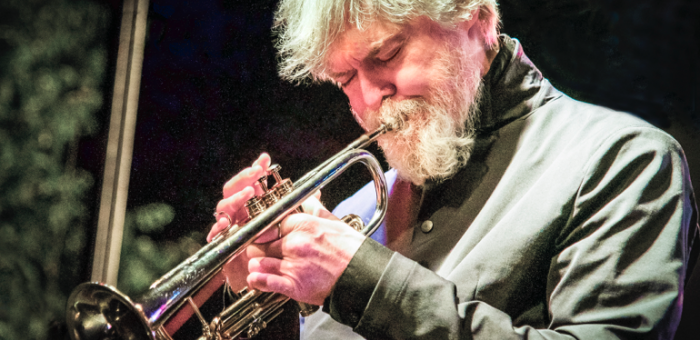Jan 13, 2026 2:09 PM
More Trump-Kennedy Center Cancellations
The fallout from the renaming of the John F. Kennedy Center for the Performing Arts to include President Donald…

Matana Roberts at the Hyde Park Jazz Festival in Chicago
(Photo: Michael Jackson)At 11 p.m. anyone with energy left flocked to the spectacular Rockefeller Chapel. As festival founder Judith Stein further exhorted donations to help fund this stylistically diverse free festival, and volunteers proffered gratuity baskets pewside, the enormous form of Weston, dressed in a plain blue dashiki suit with trademark kufi hat, tried to sneak from the cloisters to the piano stool.
Inevitably, the concert was something of a compilation of Weston’s hits—there was no “Hi Fly,” but the more intriguing “Little Niles,” written some 60 years ago, made a surreptitious entry, together with “Berkshire Blues” and “Blues For Senegal.” A thunderous left hand anchored effortless peregrinations with the right, periodically featuring percussive Monk-like hops and skips.
Despite his ease of playing, Weston was clearly engaged; he dug deep on “Blue Moses” and really got to grips with “The Healers,” after a griot-like lecture on how every living thing has its own sound—from mosquitoes to the planets.
In a dazzling floor-length silk dress, vocalist Denise Thimes came out swinging on Sept. 25, bolstered by Marlene Rosenberg on bass, drummer Charles Heath and saxophonist Skinny Williams. Thimes mixed barnstormers like “Wang Dang Doodle” with tender ballads (“The Masquerade Is Over” and Thad Jones’ “A Child is Born”). She needed to read the lyrics on her iPad for the latter, and duly collected multiple pairs of reading glasses from the members of audience, who were only too pleased to help.
Also in the crowd that afternoon was Chicago chanteuse Dee Alexander, who uplifted souls the previous night in cahoots with West Coast guest Dwight Trible.
Before the rainstorm on Sept. 25, trumpeter Marquis Hill’s Blacktet held forth, the road-tested quintet playing with precision and finesse. After tearing it up with Carmell Jones’ “Beep Durple” they changed tack for Donald Byrd’s “Fly Little Bird Fly,” inviting up spoken-word guru Harold Green, who captivated with creative, compelling lyrics.
Much hyped by the festival’s most unflagging booster, WBEZ radio host Richard Steele—“We’ve been trying to book this man for nine years here!”—multi-reedist Victor Goines closed the fest on the Wagner Stage, surprising with unscripted guests pianist Joann Daugherty and saxophonist Bernard Scavella joining renowned banjoist/vocalist Don Vappie.
Goines’ choice set list included Hermeto Pascoal’s “Baby,” a feature for his clarinet prowess; Sidney Bechet’s “Si Tu Vois Ma Mere” (heard in Woody Allen’s Midnight In Paris), which he played on soprano; then a tenor battle with Scavella on Monk’s “Rhythm-A-Ning.” As a handkerchief waving second-line finale, it was the risque charms of Danny Barker’s “Tootie Ma Is A Big Fine Thing” that had the joyful crowd at the Wagner Stage on their feet.
Not as readily digestible perhaps, the most spellbinding set of the fest may have come from TRIP, a supergroup comprising bassist Ugonna Okegwo, drummer Adam Cruz, saxophonist Mark Turner and trumpeter Tom Harrell.
As brilliant as Turner was—gymnastically navigating Harrell’s challenging “Cycle” with intervallic leaps and other investigative architecture—it was the enigmatic trumpeter who held the audience in the palm of his hand.
The trumpeter telegraphed intellectual messages devoid of distraction and ostensible ego. Nothing was announced from the stage, but when Harrell performed in a duet with Okegwo, it was on the only non-original composition, Tadd Dameron’s “If You Could See Me Now.” That song was recorded by Chet Baker back in 1959, and later Harrell would record with Baker in Italy. Baker’s distilled lyricism was conjured by Harrell at that moment, but threaded with fleeter passages than Baker was known for.
The lyrics, by Carl Sigman, include the line “One look is all you’d need to see the mood I’m in.” For the packed crowd at the Wagner Stage—beneficiaries of such an intelligently programmed wealth of free music—it was impossible to ascertain the mood of the impenetrable Harrell. All they could do was absorb the beauty of his sound.

Belá Fleck during an interview with Fredrika Whitfield on CNN.
Jan 13, 2026 2:09 PM
The fallout from the renaming of the John F. Kennedy Center for the Performing Arts to include President Donald…

Peplowski first came to prominence in legacy swing bands, including the final iteration of the Benny Goodman Orchestra, before beginning a solo career in the late 1980s.
Feb 3, 2026 12:10 AM
Ken Peplowski, a clarinetist and tenor saxophonist who straddled the worlds of traditional and modern jazz, died Feb. 2…

The success of Oregon’s first album, 1971’s Music Of Another Present Era, allowed Towner to establish a solo career.
Jan 19, 2026 5:02 PM
Ralph Towner, a guitarist and composer who blended multiple genres, including jazz — and throughout them all remained…

Rico’s Anti-Microbial Instrument Swab
Jan 19, 2026 2:48 PM
With this year’s NAMM Show right around the corner, we can look forward to plenty of new and innovative instruments…

Richie Beirach was particularly renowned for his approach to chromatic harmony, which he used to improvise reharmonizations of originals and standards.
Jan 27, 2026 11:19 AM
Richie Beirach, a pianist and composer who channeled a knowledge of modern classical music into his jazz practice,…